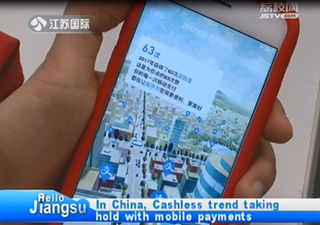People in China have been paying cash for things for thousands of years, long before other civilizations. Now, increasingly, they're paying with their cellphones. About 82 percent of the 520 million Alipay users paid for goods and services via the platform in 2017, compared with 71 percent of 450 million Alipay users in 2016, said Alipay, China's leading third-party online payment provider in a report released on Tuesday.
In 2016, Chinese consumers spent $5.5 trillion through mobile payment platforms, about 50 times more than their American counterparts.
The mobile payment app, Alipay, and WeChat Pay, which belongs to the country's leading social messaging platform, together hold a commanding 90 percent of the market.
All this is a rapid and somewhat surprising development in a country where, a couple of decades ago, it wasn't even clear that credit cards were going to catch on.
A new research was published by the Tencent Research Institute along with Ipsos research group and the Chongyang Institute for Financial Studies at Renmin University of China to illustrate how mobile payments are becoming a part of Chinese people’s everyday life.
The report analyzed the penetration and trends of cashless payments in China. The research titled “2017 Mobile Payment Usage in China” published by China Tech Insights is based on WeChat Pay data and an online survey of 6,595 respondents.
Empty pockets are the new fashion: 40% of Chinese regularly have less than RMB 100 cash in their wallet. For the majority, a single note of RMB 100 can last up to a month.
It is easy to imagine that cash will become a relic of the past for today’s teenagers. The study cited WeChat users saying that they only pay with cash when no other payment methods are available on 73% occasions or during small transactions on 46% occasions.
They are also not worried about going into the world without cash – 86% said that they felt calm without cash because they can use mobile payments. Only 12% interviewees said they would be concerned if their wallet was empty, while 4% said that was unacceptable for them.
More than half or 52% of WeChat users said they conduct less than 20% of their monthly transactions with cash. The post-80s generation is the leader in cashless transactions: 53% of them said they spend less than one fifth of their money in cash each month. Even the older generation are joining the trend—45% members born in the 60s saying that they use cash less than 20% of the time.
When it comes to geography, mobile payments have won almost all of China. Eastern and Northern China have the highest adoption rate, while the lowest is in Northeast and Northwest China.
Likewise, when it comes to adopting a cashless lifestyle, people in the Eastern and Northern China region are the most accepting with 87% and 85% interviewees respectively stating they would feel fine with no cash. Northwest and Northeast China are least enthusiastic about going cashless – 79 % and 74% users respectively claim that empty wallets wouldn’t bother them.
Dining, retail, entertainment, and travel – these are areas that excel in mobile payment. The food industry had highest penetration rates, but other areas are quickly joining the trend.
In retail, convenience stores are the highest-frequency sector for mobile payments with a 68% accepting mobile payment methods, followed by supermarkets at 63%, and malls at 62%.
For entertainment, mobile payments are most popular when purchasing movie tickets at 70%, Karaoke bars come in 2nd place at 60%, while beauty salons come 3rd at 52%.
When it comes to travel, mobile payments have become routine paying method for taxis at 62%, hotels at 57%, and tourist attractions at 56%.
Mobile payment can also accumulate credit to let social resources operate more efficiently. Sesame Credit, a credit-scoring service from Alibaba affiliate Ant Financial, attributes scores to Alipay users who have opted into the program. Users with higher scores are able to access benefits that run the gamut from waivers on car rental deposits to expedited airport security checks. In 2017, people in Nanjing enjoyed the deposit-free Sesame Credit services by 176% more than they did in 2016 with a total of 470 million deposits waived. Mobile payments can also reduce carbon emissions. With online payment of utilities and public transport, they reduce the total carbon emissions of 180,000 tons in total, equivalent to saving 290 million kilowatt hours of electricity.
Launched in 2004 and operated by Ant Financial Services Group, Alipay is the world’s leading mobile and online payment platform. Alipay has evolved from a digital wallet to a lifestyle enabler. Users can hail a taxi, book a hotel, buy movie tickets, pay utility bills, make appointments with doctors, or purchase wealth management products directly from within the app. Over 8 million brick-and-mortar merchants now accept Alipay across China.






